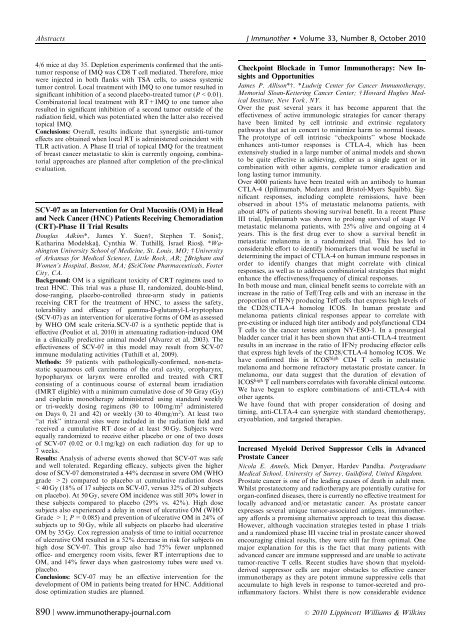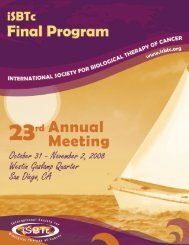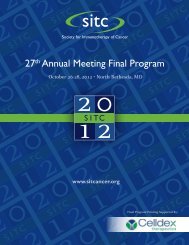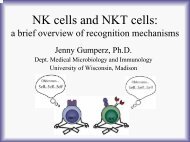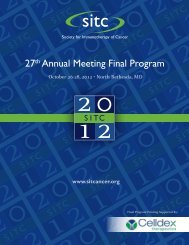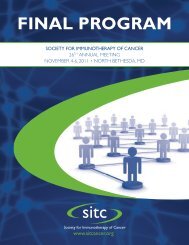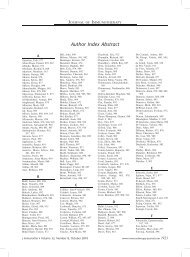Abstracts for the 25th Annual Scientific Meeting of the International ...
Abstracts for the 25th Annual Scientific Meeting of the International ...
Abstracts for the 25th Annual Scientific Meeting of the International ...
Create successful ePaper yourself
Turn your PDF publications into a flip-book with our unique Google optimized e-Paper software.
<strong>Abstracts</strong> J Immuno<strong>the</strong>r Volume 33, Number 8, October 2010<br />
4/6 mice at day 35. Depletion experiments confirmed that <strong>the</strong> antitumor<br />
response <strong>of</strong> IMQ was CD8 T cell mediated. There<strong>for</strong>e, mice<br />
were injected in both flanks with TSA cells, to assess systemic<br />
tumor control. Local treatment with IMQ to one tumor resulted in<br />
significant inhibition <strong>of</strong> a second placebo-treated tumor (P2) compared to placebo at cumulative radiation doses<br />
1; P = 0.085) and prevention <strong>of</strong> ulcerative OM in 24% <strong>of</strong><br />
subjects up to 50 Gy, while all subjects on placebo had ulcerative<br />
OM by 35 Gy. Cox regression analysis <strong>of</strong> time to initial occurrence<br />
<strong>of</strong> ulcerative OM resulted in a 52% decrease in risk <strong>for</strong> subjects on<br />
high dose SCV-07. This group also had 75% fewer unplanned<br />
<strong>of</strong>fice- and emergency room visits, fewer RT interruptions due to<br />
OM, and 14% fewer days when gastrostomy tubes were used vs.<br />
placebo.<br />
Conclusions: SCV-07 may be an effective intervention <strong>for</strong> <strong>the</strong><br />
development <strong>of</strong> OM in patients being treated <strong>for</strong> HNC. Additional<br />
dose optimization studies are planned.<br />
Checkpoint Blockade in Tumor Immuno<strong>the</strong>rapy: New Insights<br />
and Opportunities<br />
James P. Allison*w. *Ludwig Center <strong>for</strong> Cancer Immuno<strong>the</strong>rapy,<br />
Memorial Sloan-Kettering Cancer Center; w Howard Hughes Medical<br />
Institute, New York, NY.<br />
Over <strong>the</strong> past several years it has become apparent that <strong>the</strong><br />
effectiveness <strong>of</strong> active immunologic strategies <strong>for</strong> cancer <strong>the</strong>rapy<br />
have been limited by cell intrinsic and extrinsic regulatory<br />
pathways that act in concert to minimize harm to normal tissues.<br />
The prototype <strong>of</strong> cell intrinsic ‘‘checkpoints’’ whose blockade<br />
enhances anti-tumor responses is CTLA-4, which has been<br />
extensively studied in a large number <strong>of</strong> animal models and shown<br />
to be quite effective in achieving, ei<strong>the</strong>r as a single agent or in<br />
combination with o<strong>the</strong>r agents, complete tumor eradication and<br />
long lasting tumor immunity.<br />
Over 4000 patients have been treated with an antibody to human<br />
CTLA-4 (Ipilimumab, Medarex and Bristol-Myers Squibb). Significant<br />
responses, including complete remissions, have been<br />
observed in about 15% <strong>of</strong> metastatic melanoma patients, with<br />
about 40% <strong>of</strong> patients showing survival benefit. In a recent Phase<br />
III trial, Ipilimumab was shown to prolong survival <strong>of</strong> stage IV<br />
metastatic melanoma patients, with 25% alive and ongoing at 4<br />
years. This is <strong>the</strong> first drug ever to show a survival benefit in<br />
metastatic melanoma in a randomized trial. This has led to<br />
considerable ef<strong>for</strong>t to identify biomarkers that would be useful in<br />
determining <strong>the</strong> impact <strong>of</strong> CTLA-4 on human immune responses in<br />
order to identify changes that might correlate with clinical<br />
responses, as well as to address combinatorial strategies that might<br />
enhance <strong>the</strong> effectiveness/frequency <strong>of</strong> clinical responses.<br />
In both mouse and man, clinical benefit seems to correlate with an<br />
increase in <strong>the</strong> ratio <strong>of</strong> Teff/Treg cells and with an increase in <strong>the</strong><br />
proportion <strong>of</strong> IFNg producing Teff cells that express high levels <strong>of</strong><br />
<strong>the</strong> CD28/CTLA-4 homolog ICOS. In human prostate and<br />
melanoma patients clinical responses appear to correlate with<br />
pre-existing or induced high titer antibody and polyfunctional CD4<br />
T cells to <strong>the</strong> cancer testes antigen NY-ESO-1. In a presurgical<br />
bladder cancer trial it has been shown that anti-CTLA-4 treatment<br />
results in an increase in <strong>the</strong> ratio <strong>of</strong> IFNg producing effector cells<br />
that express high levels <strong>of</strong> <strong>the</strong> CD28/CTLA-4 homolog ICOS. We<br />
have confirmed this in ICOS high CD4 T cells in metastatic<br />
melanoma and hormone refractory metastatic prostate cancer. In<br />
melanoma, our data suggest that <strong>the</strong> duration <strong>of</strong> elevation <strong>of</strong><br />
ICOS high T cell numbers correlates with favorable clinical outcome.<br />
We have begun to explore combinations <strong>of</strong> anti-CTLA-4 with<br />
o<strong>the</strong>r agents.<br />
We have found that with proper consideration <strong>of</strong> dosing and<br />
timing, anti-CLTA-4 can synergize with standard chemo<strong>the</strong>rapy,<br />
cryoablation, and targeted <strong>the</strong>rapies.<br />
Increased Myeloid Derived Suppressor Cells in Advanced<br />
Prostate Cancer<br />
Nicola E. Annels, Mick Denyer, Hardev Pandha. Postgraduate<br />
Medical School, University <strong>of</strong> Surrey, Guild<strong>for</strong>d, United Kingdom.<br />
Prostate cancer is one <strong>of</strong> <strong>the</strong> leading causes <strong>of</strong> death in adult men.<br />
Whilst prostatectomy and radio<strong>the</strong>rapy are potentially curative <strong>for</strong><br />
organ-confined diseases, <strong>the</strong>re is currently no effective treatment <strong>for</strong><br />
locally advanced and/or metastatic cancer. As prostate cancer<br />
expresses several unique tumor-associated antigens, immuno<strong>the</strong>rapy<br />
af<strong>for</strong>ds a promising alternative approach to treat this disease.<br />
However, although vaccination strategies tested in phase I trials<br />
and a randomized phase III vaccine trial in prostate cancer showed<br />
encouraging clinical results, <strong>the</strong>y were still far from optimal. One<br />
major explanation <strong>for</strong> this is <strong>the</strong> fact that many patients with<br />
advanced cancer are immune suppressed and are unable to activate<br />
tumor-reactive T cells. Recent studies have shown that myeloidderived<br />
suppressor cells are major obstacles to effective cancer<br />
immuno<strong>the</strong>rapy as <strong>the</strong>y are potent immune suppressive cells that<br />
accumulate to high levels in response to tumor-secreted and proinflammatory<br />
factors. Whilst <strong>the</strong>re is now considerable evidence<br />
890 | www.immuno<strong>the</strong>rapy-journal.com r 2010 Lippincott Williams & Wilkins


